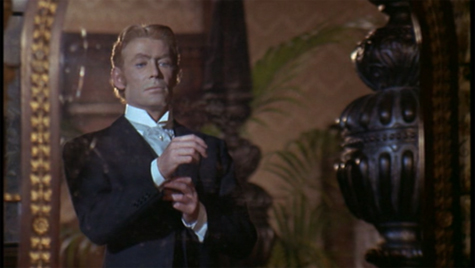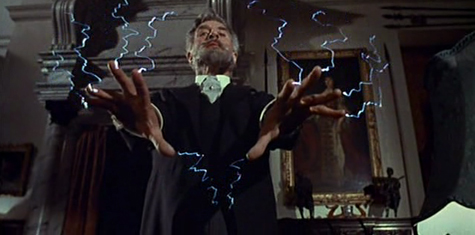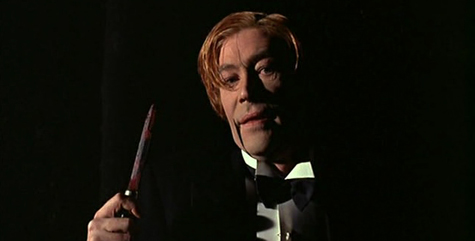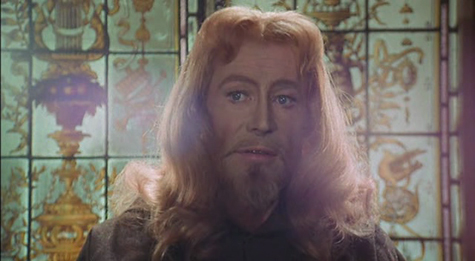The Ruling Class is one of those movies you hear of all your life without seeing, adding to its aura as something you can’t quite believe actually happened at all. A 1972 satire of British class-war and religious delusion, it’s the kind of movie that soon after couldn’t have been made, and only more recently could have been again, with the 2000s’ relaxed ideological restrictions and heightened command of post-reality.
Peter O’Toole, in a bravura movie-long manic episode of accurate mental turmoil and a kind of vaudevillian political drag, plays the disturbed scion of a minor but self-important British noble clan who is left as heir to the fortune and head of the household by the death of his estranged father. “Jack” by name, he prefers to answer to “JC,” since he believes he’s the messiah and dresses the part (with aid from creepy thrift store Jesus-painting makeup and lighting). He will mortally wound the dignity of the old-line family if his psychiatrist (who bears a disquieting resemblance to the Martin Amis of our own time, though that may not be a sign of anything) doesn’t succeed in snapping him out of it. The shrink does succeed, by restoring Jack to demented elite propriety, after which he fancies himself a more Hitler-style savior of England’s self-image.

This was in recessionary and insurrectionist times for the UK, in an extended postwar slump of influence and prosperity and a more domestic war with the IRA. As a kid, clips of O’Toole breaking from ethereal sermons or stern lectures into archaic song-and-dance numbers suggested a transgressive romp that didn’t prepare me for the profound unpleasantness of the actual flick. I assume that early-‘70s Britain was as stifling to a native as this film is to me, in the way I know late-‘70s America to have been as drab and sour and endless as Spike Lee’s Summer of Sam (rivetingly) was, though the vicarious version delivered by Ruling Class is a lot less easy to sit through.
That’s an unfair consequence of which one I happened to grow up with, but knowing what we know now it’s hard to imagine a movie taking two-and-a-half hours to circle this one’s single conceit of the impracticalities of hippie rule (as embodied by O’Toole-Jesus) giving way to its mirror-image, the over-responsibility of right-wing takeover (as incarnated by Nazi-O’Toole). We get it, though maybe at the time the filmmakers felt it necessary to get it through people’s skulls so they could start thinking about a third way.

However, at the exact center of that single theme it gets interesting for geek scholars—to break JC of his own conceit the shrink brings in a rival patient, a more macho, Old Testament type who fancies himself the vengeful, not loving God. Believing himself in control of elemental forces, “the electric messiah” is called on to break Jack of his delusion by showing there can’t be two Gods at once and thus they may both be mistaken. The way he does this is by shooting imaginary lightning-bolts at Jack, with pre-CGI film-scratches that are pretty audacious for the time; Jack, being as suggestible as his rival, actually sees these along with us, though the other characters don’t. The filmmakers may have thought they were reaching back into medieval psychomachia and William Blake drawings for their imagery, but we dweebs see a clear grasp of a much later era’s superhero and supernatural cinema. The cosmic struggle, with its power-bolts and shouted metaphysical debate, is straight out of the better and worse superbeing sagas and set-pieces, serving as a kind of advance satire of the overblown ideological conflicts in society, and blockbuster diversions from them at the multiplex, that were to come.
VR, time-travel and horror all get glances as well; once Jack makes his transition to black-suited autocrat, the Victorian echoes are all too clear and he moonlights as, yes, “Jack” the Ripper (widely thought to have been an unaccountable British aristocrat even then), and his murder scenes find him suddenly surrounded by the streets of a previous century’s Britain—a flashback technique which is itself a foretaste of the kind of temporal and perceptual displacement David Cronenberg and his collaborators would do much more seamlessly and convincingly in their version of The Dead Zone a decade later.

Of course dystopian fiction is a modern classic as fresh as tomorrow’s theocratic Congressional speech. But for all its confidence that the traditional order’s time was past, the film still has a same-as-the-old-boss vision of Orwellian Brit-tatorship, with O’Toole’s Aryan-looking patriarchal aristocrat. One point the movie doesn’t anticipate is the form that post-flower-power fascism would take. Over in the States Gore Vidal was warning us that American tyranny would assume a folksy and reassuring shape and he got it “right” with Reagan; the makers of Ruling Class were so certain that the wounded and desperate elite would regroup that they didn’t see the populist, small-business-class, old-boy-crashing Margaret Thatcher coming, even though the ideological dread and have/have-not antagonism of this film captures the gloom and tension of Thatcher’s era much more closely than last year’s movie about her did.
The inaccuracy of the prediction is one of Ruling Class’ few, but crucial, failures of imagination. I found myself wishing the film had been made a few years later, when one of the Pythons would have had enough big-studio stature to be signed on as director. The movie that got made swerves from high-bred mannerism to absurdist mischief suitably surreally, but a more postmodern creative team would have brought a clearer eye to the absurdity of the entire continuum of imperial formality and its anarchic outlet. As it was, The Ruling Class saw forward to several modes of present-day filmmaking, but somewhat left them on the drawing board. And it knew how to depart from certain strictures of cultural thinking and cinematic method without entirely decoding them. The Ruling Class could sense that the Matrix was all around us, but, not unforgivably, it couldn’t quite yet see a way out.
Adam McGovern’s dad taught comics to college classes and served as a project manager in the U.S. government’s UFO-investigating operation in the 1950s; the rest is made up. There is material proof, however, that Adam has written comicbooks for Image (The Next issue Project), Trip City.com, the acclaimed indie broadsheet POOD, and GG Studios, blogs regularly forHiLoBrow.comandComicCritiqueand posts at his own risk on the recently launched Fanchild. He lectures on pop culture in forums like The NY Comics & Picture-story Symposium and interviewed time-traveling author Glen Gold at the back of his novel Sunnyside (and at this link). Adam proofreads graphic novels for First Second, has official dabblings in produced plays, recorded songs and published poetry, and is available for commitment ceremonies and intergalactic resistance movements. His future self will be back to correct egregious typos and word substitutions in this bio any minute now. And then he’ll kill Hitler, he promises.










